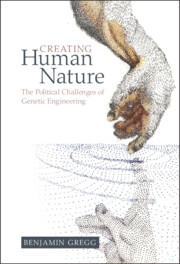Book contents
- Creating Human Nature
- Creating Human Nature
- Copyright page
- Dedication
- Contents
- Acknowledgments
- Introduction
- Part I The Political Bioethics of Regulating Genetic Engineering
- Part II The Political Dimensions of Engineering Intelligence
- Part III Inequality as an Unintended Consequence Locally and as a Planetary Phenomenon
- 8 A Human Right to Freedom from Genetic Disability
- 9 Deploying Epigenetics to Identify Biologically Influenced Social Inequalities
- 10 Genetic Engineering as a Technology of the Anthropocene
- Coda
- References
- Index
Coda
Bioethics as Political Theory
from Part III - Inequality as an Unintended Consequence Locally and as a Planetary Phenomenon
Published online by Cambridge University Press: 13 October 2022
- Creating Human Nature
- Creating Human Nature
- Copyright page
- Dedication
- Contents
- Acknowledgments
- Introduction
- Part I The Political Bioethics of Regulating Genetic Engineering
- Part II The Political Dimensions of Engineering Intelligence
- Part III Inequality as an Unintended Consequence Locally and as a Planetary Phenomenon
- 8 A Human Right to Freedom from Genetic Disability
- 9 Deploying Epigenetics to Identify Biologically Influenced Social Inequalities
- 10 Genetic Engineering as a Technology of the Anthropocene
- Coda
- References
- Index
Summary
The preceding chapters work a hunch into an insight: political theory with bioethical ambition, bioethics as political theory, political bioethics. In application, the approach concluded that proceduralism can provide legitimate bioethical decisions (Chapter 1); that global regulatory norms are implausible (Chapter 2); that a political notion of human nature oriented on a political notion of human rights offers a normative standard of potentially wide embrace (Chapter 3); that the future person’s decisional autonomy can function as a regulatory principle at the point of genetically manipulating the embryo (Chapter 4); that equal citizenship requiring a minimum genetic capacity may justify some forms of cognitive engineering (Chapter 5); that political community should never allow artificial intelligence to displace citizens’ mutual taking of responsibility (Chapter 6); that deployment of a pupil’s genetic information to inform personalized education is politically ambiguous (Chapter 7); that a human right to freedom from genetic disability would promote well-being as autonomy (Chapter 8); that epigenetic science offers an additional means of identifying sources of some social inequalities (Chapter 9); and that socially responsible human genetic editing need not be planetarily harmful (Chapter 10).
- Type
- Chapter
- Information
- Creating Human NatureThe Political Challenges of Genetic Engineering, pp. 218 - 228Publisher: Cambridge University PressPrint publication year: 2022

